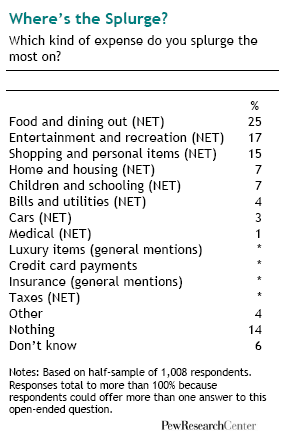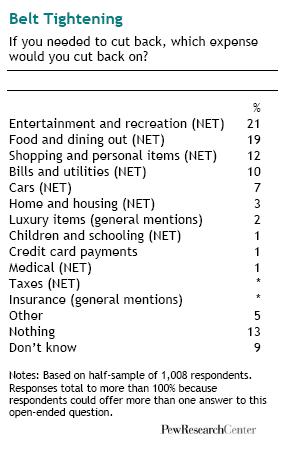
For all their self-described watchfulness on spending practices, Americans are also aware that some expenses are a bit of a “splurge.” When the public is asked to name the items they splurge on the most, three kinds of expenses dominate: food and dining out (25% of responses); entertainment and recreation (17%); and shopping and personal items (15%).
People also cite these same three categories as the ones they’d be most inclined to cut back on if necessary. The most oft-cited mentions for cut backs are entertainment and recreation (21% of responses) and food and restaurant expenses (19%), followed by shopping and personal items (12%).
Spending assessments vary by gender, age and income. Women are more inclined than men to say they splurge on – and if necessary would cut back on – shopping and personal items. Men are more likely than women to say they splurge on entertainment and recreation expenses.

Younger adults (especially those under age 30) are more likely than their elders to say they splurge on shopping and personal items. Adults in the middle age groups are a bit more likely than their younger or older counterparts to say they splurge on entertainment and recreation expenses. All age groups are about equally likely to say they splurge on food and dining expenses.
Those with higher incomes (family incomes of at least $100,000) are more likely than others to say they splurge most on entertainment and recreation expenses.
About the Survey
Results for this survey are based on telephone interviews conducted with a nationally representative sample of adults, ages 18 years and older, living in continental U.S. telephone households.
- Interviews conducted Oct. 18 – Nov. 9, 2006
- 2,000 interviews
- Margin of sampling error is plus or minus 2.5 percentage points for results based on the total sample at the 95% confidence level. The margin of sampling error is higher for results based on subgroups of respondents.
Survey interviews conducted under the direction of Princeton Survey Research Associates International. Interviews were conducted in English and Spanish.
Bear in mind that question wording and practical difficulties in conducting surveys can introduce error or bias in the findings of opinion polls.


